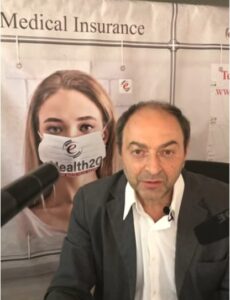TIME MAGAZINE RECENTLY published a story about a woman who contracted the coronavirus. Her temperature spiked, her lungs filled with fluid and she needed to go to the emergency room three times. While she eventually improved, at least physically, when she received the medical bill she was stunned: It came to almost $35,000. When she got sick she was one of 27 million Americans without health insurance. So while her health improved, her personal finances may never recover – at least not for a long time.

Most people, thankfully, will never get that sick, and those with insurance will be covered. In fact, the federal government even boosted coverage in response to the coronavirus, or COVID-19. In March, Congress passed the Families First Coronavirus Response Act, which requires most private health plans to cover testing for the coronavirus with no cost sharing during the emergency period. According to the Kaiser Family Foundation, some states have passed similar requirements for insurers in their state, and many private insurance companies have voluntarily expanded coverage for testing.
The new law also requires health plans under the Affordable Care Act to cover coronavirus testing and to waive cost sharing and prior authorization. This requirement applies to visits in physician offices, urgent care centers and emergency rooms associated with testing, but does not apply to short-term plans, sharing ministries or certain Farm Bureau plans, according to KFF.
But what can the uninsured do? And what about the many millions of Americans who have been or may yet be laid off, losing their insurance along with their jobs?[
New Open Enrollment Period for ACA
Noah Lang is the CEO of Stride Health, a health insurance company that specializes in coverage for workers in the gig economy. It partners with companies like Uber, Keller Williams and Etsy to find coverage for part-time and freelance workers. (U.S. News is also a partner.) Lang says that many of those without insurance still have the ACA to protect them.
“The ACA is still the law of land, and every state has a marketplace to access affordable coverage,” Lang says. Some states manage their own ACA market, while the others are built off of the federal market, Healthcare.gov.
Normally, individuals can enroll in ACA coverage only during open enrollment, which typically falls at the end of the calendar year. But in the face of the COVID-19 pandemic, every state with its own health care exchange except Idaho has reopened enrollment with a COVID-19 Special Enrollment Period, or SEP. As of March 24, the SEP is offered in the following states and districts:
- California
- Colorado
- Connecticut
- Maryland
- Massachusetts
- Minnesota
- Nevada
- New York
- Rhode Island
- Vermont
- Washington
- Washington, D.C.
All uninsured residents of each state are eligible, but the enrollment period is short. The deadline for enrollment is:
- California: April 30
- Colorado: April 3
- Connecticut: April 2
- Massachusetts: April 25
- Minnesota: April 21
- Vermont: April 17
- Washington: April 8
- All others: April 15






